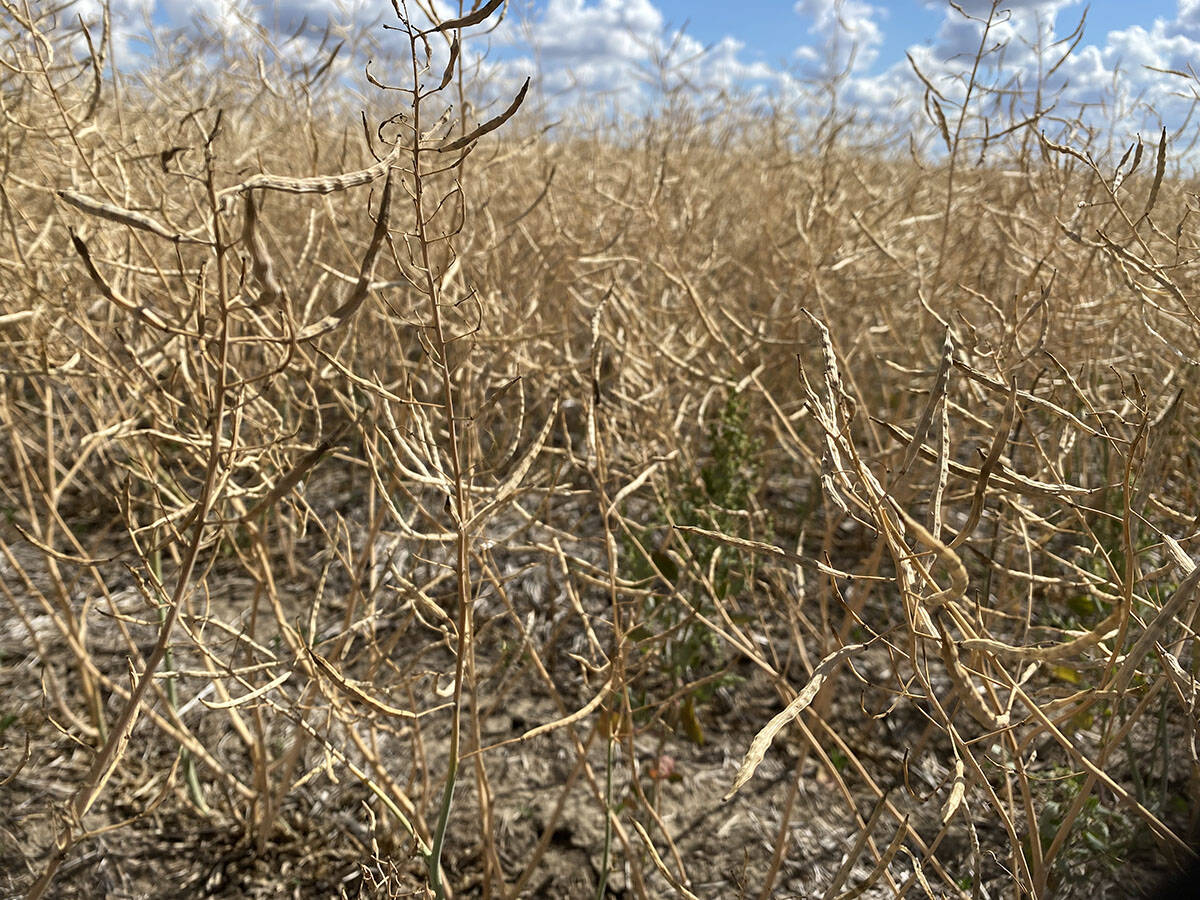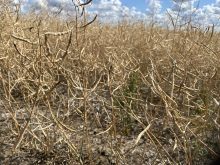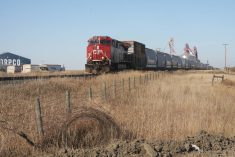Treat earth right
A picture is sometimes more informative than 1,000 words. I am
referring to the picture on page 5 of the WP, June 6, “Scenes Like Days
Gone By.”
Sadly enough it is not “days gone by.” What caught my attention
immediately is the absence of trees or shrubs or hedges as far as one
can see. Are we creating these desert landscapes or are we not doing
enough to prevent erosion and climate changes of all sorts? The world
Read Also

Crop insurance’s ability to help producers has its limitations
Farmers enrolled in crop insurance can do just as well financially when they have a horrible crop or no crop at all, compared to when they have a below average crop
is full of examples of deserts and ruined landscapes created by men.
There are also many examples of restoration of devastated land brought
back to life, back to productive agriculture.
This picture brought back in my memory a discussion I had with a
Saskatchewan farmer 40 years ago. He was getting rid of all the rows of
trees and hedges on his farm and felt that his land was too valuable
and showed me how many acres of wheat he would gain.
I also recall the time when trees were readily available to farmers at
no cost at the nursery in Indian Head, Sask., and that there was not a
great demand.
Let there be no doubt, the way we treat the earth, that is the way the
earth will treat us in return.
– Henry Dahle,
Wynndel, B.C.
Ducks Unlimited
Keith Yoder’s letter (Open Forum, June 13) fails to acknowledge the
many beneficial working relationships Ducks Unlimited Canada enjoys
with Prairie landowners.
DUC is a 100 percent Canadian owned corporation that secures habitat
through purchases, conservation easements, donations and land leases.
In total, land owned by DUC represents only 0.15 percent of farmland in
the Prairies when farm area, identified in the 1996 Census of
Agriculture, is the base.
Of greater significance in terms of DUC’s influence on the landscape
are the actions of 12,000 prairie landowners who voluntarily partner
with DUC.
Through DUC conservation programs, producers are participating in
forage conversion and grazing programs that increase forage supplies
and increase the industry’s sustainability.
Landowners have also increased production of waterfowl friendly crops,
like winter cereals, that DUC promotes to increase producer’s profit
and, at the same time, improve wildlife habitat.
Grassland nesting cover created by DUC is tendered locally for forage
when management is required. This year, under a one-time only drought
response program, selected DUC grasslands in extreme drought areas were
opened for grazing or forage under tendered permit.
While Mr. Yoder fails to see the value of DUC’s conserved lands, over
400 producers in Saskatchewan and Alberta accessed DUC lands for forage
this year. In addition, thousands of cattle drink water from DUC
wetland projects and recently, two communities in the Prairies accessed
DUC wetlands for household water needs.
Western Canadians provide DUC with its greatest financial contribution
on average per contributor. Every dollar generated in the prairie
provinces is reinvested into conservation within the region.
With a 64-year history of grassroots support for DUC’s conservation and
fundraising efforts, the people on the Prairies have, contrary to Mr.
Yoder’s statement, expressed commendable community spirit.
It’s this spirit that fuels DUC’s partnerships with the agricultural
community.
– Gordon K. Edwards,
Director of Regional Operations, Ducks Unlimited Canada,
Edmonton, Alta.
Farming habit
In the June 13 edition, Barry Wilson explained how farmers are in
serious trouble and the figures show that farmers are depending on
off-farm income to finance their farming habit.
Habit? My brainwaves jumped record heights. Why did he write habit?
Just an unlucky chosen word? Or what else had he in mind? Are farmers
in the same lane like drug addicts, smokers and gamblers?
I realize farming is a much worse addiction, money-wise.
Isn’t it about time for psychologists to take that farming-habit thing
under scientific observation to find out why farmers keep doing what
they are doing?
Maybe they come along a newfound mental disorder. After patenting a
name for it, like Manic Farming Dementia, the government comes up with
money to found support groups and institutions with tennis court and
golf course. Hey, here comes my holiday.
Some brave farmers might try cold turkey. Buy a computer and surf the
internet. Get hooked and you forget easy that seasons even exist and
the beasts want feed. Never lose hope for a cure. Look out for that
win-win option for the farmer and the government.
You don’t have to work anymore to finance your farming habit and the
government doesn’t have to worry about the budget how to finance a
bottomless plunge. They’ll gladly mail you a welfare cheque.
And if you get bored, the casino is right around the corner. City life
has a lot of exciting opportunities. How about an affordable habit?
– Ramona Morgenstern,
Grandview, Man.
Paranoia
It is astounding and disturbing the level of paranoia among a few vocal
farming groups about Bill C-15B, the amendments to the animal cruelty
provisions of the Criminal Code. This paranoia is based on an
unfortunate misunderstanding of the bill and its application in law.
Part of the problem is that one needs to know more than just the words
in the bill to understand its meaning. The recent opinion piece by
Western Producer editors, “Animal cruelty bill: Amend it or scrap it”
demonstrated a gross misunderstanding of the bill.
They claimed that, “As is, the bill leaves livestock producers open to
vexatious lawsuits brought by individuals or groups that don’t approve
of common management practices.”
Firstly, we are talking about criminal charges, not lawsuits. Secondly,
animal rights groups or individuals simply do not have the tools to
bring the frivolous charges that these farm spokespersons so
desperately fear. These groups or individuals can only attempt to bring
charges as private prosecutions and, under Bill C-15B, it will be
significantly more difficult for them to do this than it is today.
The truth is, Bill C-15B offers greater protection for animal users
than the laws we have today. This is because of the additional
screening processes that will apply to private prosecutions. The bill
elevates animal crimes to hybrid offences from the current designation
as summary conviction.
Hybrid offences require a much greater involvement by a crown
prosecutor to ensure charges are valid before they proceed. In
addition, the government recently introduced a new screening process
specifically to prevent frivolous private prosecutions from proceeding.
This process requires a provincial court judge to approve the charges
before the accused is even notified.
Also, it is completely false to state that moving animal crimes out of
the property section of the Criminal Code removes legal protections for
animal users. It is completely reasonable for our 21st century laws to
recognize animals as different from other pieces of property.
This move, however, does not remove the ability of people to own
animals and it does not remove access to common law defences such as
legal justification and lawful excuse.
As clearly stated by parliamentary secretary Paul Macklin in the House,
“all defences that could possibly be relevant in intentional cruelty
and criminal neglect cases are expressly made applicable.”
It’s almost as if the farming groups and others opposing this bill are
asking for some kind of exemption to allow them to inflict deliberate
cruelty on animals. I’m sure that’s not what they want, but they should
get their facts straight and they would see that Bill C-15B is long
overdue and maintains all the protections for animal users that our
current laws provide….
The Canadian Federation of Humane Societies invites those who make
these erroneous and misleading statements to debate these facts with us.
– Shelagh MacDonald,
Program Director,
Canadian Federation of Humane Societies,
Nepean, Ont.
The truth
We are proud of the fact we live in a democracy, where we get the
opportunity to choose our leaders and where a free press is allowed to
herald and interpret events.
Unfortunately, others see things in a way that falls a little short of
political bosses, who vote on behalf of their constituents so that the
will of the people might be represented.
I’m sure the prime minister would agree if he wasn’t so busy demanding
letters of loyalty from his MPs and coercing members of his cabinet to
support his bid for a renewed mandate as leader of his party. Then
again, we do live in a “Liberal” democracy.
We seek freedom of the press, believing that trust lies with having
access to the truth. The truth was important enough to Joseph Howe when
he criticized government officials in Nova Scotia, only to be charged
with criminal libel. His victory in that 1835 case established the
precedent that even the highest official in the land was not immune to
published criticism or reproach.
Balanced reporting, looking at both sides of an issue, is the hallmark
of journalistic integrity. To disallow criticism merely for partisan
reasons, whether such censorship is enforced by the government itself
or by powerful private citizens, would seem a betrayal.
Real news reporting is subservient only to the truth. Anything else is
just propaganda and spin doctoring.
Obviously not everyone can handle the truth, but I think most of us
want to see responsible government made even more responsible by those
entrusted with providing a balanced analysis of events.
– Ron Thornton,
Edmonton, Alta.
















